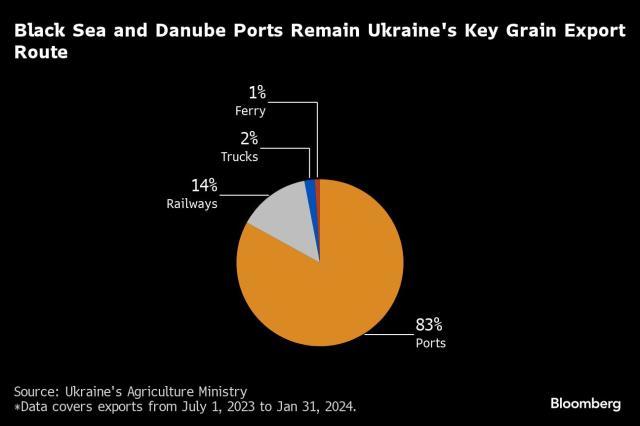Ukraine said it’s planning an additional route via the Danube River to boost exports to pre-war levels as a spat with Poland over agricultural deliveries blocks a land border with the European Union.
The Danube became a priority avenue for Ukrainian supplies after Russia exited a United Nations-backed safe corridor in the Black Sea last year. Still, a significant amount of crops also flow by rail and road via the EU, and Polish farmers — protesting what they call an uncontrolled flood of Ukrainian food products — are blocking a key route.
“Our plans for this year is to remove all artificial obstacles for exporters and we are working to improve domestic logistics,” Ukrainian Infrastructure Minister Oleksandr Kubrakov said in an interview on the sidelines on Munich Security Conference. “We are planning container transportation via the upper Danube” as Romania is “more predictable” than the Polish border.
The proposed new route — few details are immediately known — would run from the Ukrainian port of Izmail to the Romania’s Constanta and the Danube ports of Germany, according to the minister. The Ukrainian Danube Shipping Co. has already built a second large-tonnage SLG barge to deliver cargo, the Infrastructure Ministry said earlier this month.

Ukrainian exports last year, largely food and metal products, were worth $35.8 billion, nearly 48% below its pre-war levels in 2021, according to government data. After the UN-brokered deal collapsed in July last year, Kyiv managed to carve out a new shipping path via the Black Sea but the Danube remains crucial.
Although many exporters prefer the Black Sea because it is cheaper, volumes via the Danube still amount to 1.2 million-1.8 million tons per month, Kubrakov said.
However, Kyiv has also used the road and rail for trade throughout the war and export volumes via Poland have currently fallen to 300,000 tons per month from 1.3 million in 2022 with automobile crossings totally blocked.
The protests are affecting both European and Ukrainian exporters, according to Kubrakov.
“It’s definitely not a threat to Polish farmers, as we are transporting not only agrarian stuff, but auto parts for German car manufacturers, processed products that are not directed to Poland,” the minister said. “Blocking the border means billions of losses for both our economy and the economies of the European Union.”

Follow us on social media: